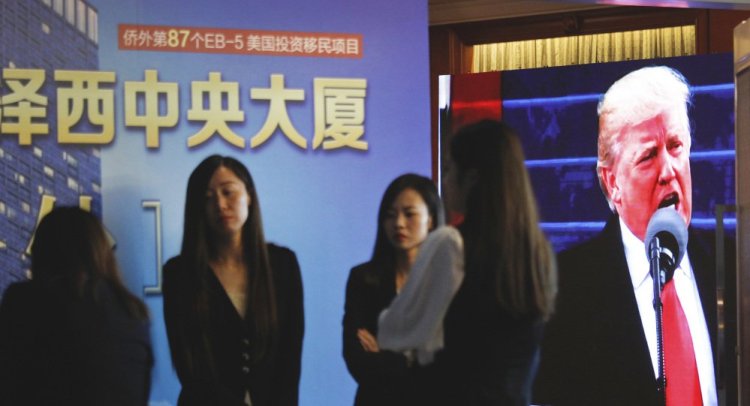WASHINGTON — Plenty can go wrong when foreign money mixes with immigration green cards, real estate deals and political connections.
Revelations that the sister of Jared Kushner, President Trump’s son-in-law and adviser, promoted a program offering a path to U.S. citizenship to Chinese backers in a Kushner family project bring new scrutiny to a foreign investor visa program. The Kushner Companies apologized Monday, saying it had not meant to lure investors by using Jared Kushner’s name at an investment promotion event held Saturday at a Ritz Carlton in Beijing. Marketing materials for the event promoted Nicole Kushner Meyer as Jared’s sister, and cited the Kushner family’s “celebrity” status.
The project promoted by Meyer in Beijing is a 79-story apartment building called Kushner 1. The company is seeking 300 aspiring U.S. residents to invest a total of $150 million, and it follows other Kushner family projects using the investment program known as EB-5, including a nearby Trump-licensed building promoted as “Trump Bay Street.”
At a press briefing, White House spokesman Sean Spicer said Jared Kushner has no involvement in the project. An attorney for Jared Kushner said he had sold his stake to a trust benefiting other members of the Kushner family, and would recuse himself from related policy matters while serving as an adviser to Trump.
Though the foreign investor immigration program has become a source for cheap real estate financing for projects like the Kushner family’s, questions about its fairness and national security implications have made it a political briar patch for years. One recent scandal involved Hillary Clinton’s brother.
Created in 1990 as a way to encourage investment during a recession, the program requires foreigners to invest $1 million in a business that sustainably employs 10 people anywhere, or $500,000 in rural areas or those with high unemployment.
The smaller investment is done through a regional center, a collection point for multiple investments that can be used for a variety of projects. The regional center is the root of many complaints about the program.
As part of such deals, investors – who in recent years have been overwhelmingly from China – typically accept below-market investment returns to qualify for a visa, allowing the developer to pocket the savings on financing costs. After as little as two years, participants can apply for a fast-track green card and later U.S. citizenship. With permanent residency in hand, the foreign investors can then sponsor additional visas to bring in family members.
Critics have faulted the program for failing to bring investment into downtrodden communities as intended. By gerrymandering together rich geographic areas with poor ones, developers have managed to win approval from economic development authorities for luxury projects in Manhattan, Beverly Hills and Miami’s South Beach.
Beyond the question of whether the program encourages development as intended lie allegations of political favoritism and national security risks.
On Monday, Trump administration spokesman Sean Spicer said the president would look at the foreign investor visa program as part of a broader review of immigration policy.
Copy the Story LinkSend questions/comments to the editors.



Success. Please wait for the page to reload. If the page does not reload within 5 seconds, please refresh the page.
Enter your email and password to access comments.
Hi, to comment on stories you must . This profile is in addition to your subscription and website login.
Already have a commenting profile? .
Invalid username/password.
Please check your email to confirm and complete your registration.
Only subscribers are eligible to post comments. Please subscribe or login first for digital access. Here’s why.
Use the form below to reset your password. When you've submitted your account email, we will send an email with a reset code.